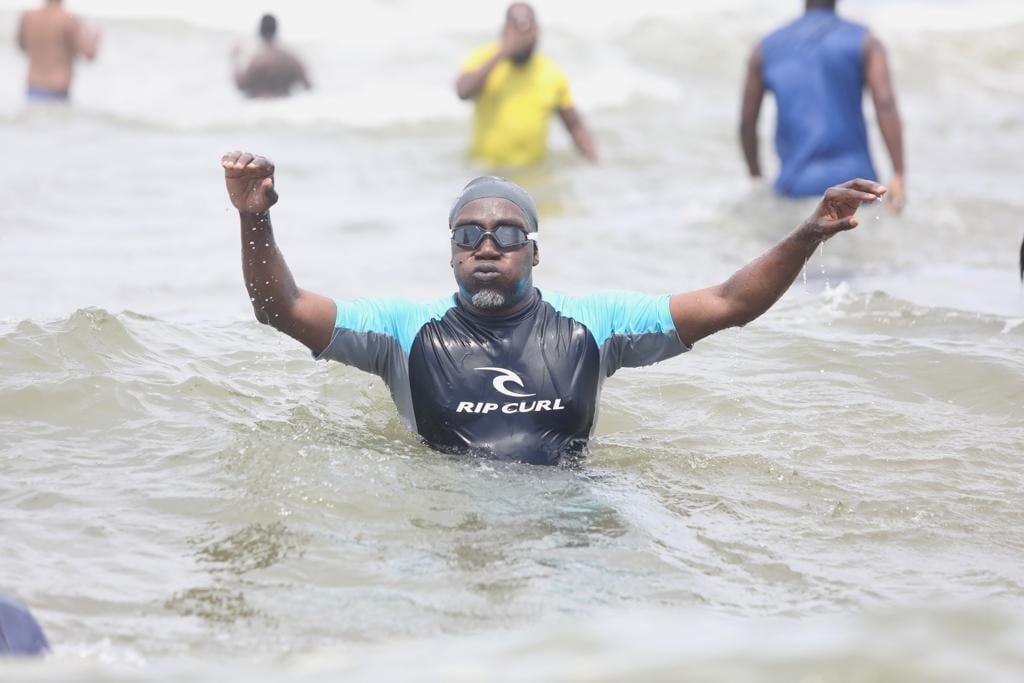Africa-Press – South-Africa. Despite fluctuating water levels and incomplete infrastructure, the mayor of Durban, Mxolisi Kaunda, swam at North Beach on Thursday, to prove to holidaymakers and residents that the beaches are safe.
Kaunda and a team of officials, influencers and metro police launched the festive season by displaying beach sports and highlighting a big safety push this year.
After being challenged by the DA last week to swim in the beaches he deemed safe, particularly Umhlanga Main Beach, Kaunda took a dip at North Beach instead.
Opposition parties on Thursday labelled Kaunda a failure for missing his deadline to completely fix the infrastructure, which was further damaged after the April floods.
Varied E. coli readings
While Kaunda declared that the North Beach and Umhlanga Main Beach were presently safe to use, readings at both sites had varied in recent months.
As recent as seven days ago, North Beach, where Kaunda bravely revelled, showed worryingly high levels of E. coli recorded by an independent company, Talbot, The Art of Water.
eThekwini, who recently teamed up with Talbot to publicly release E. coli readings, also showed high levels a week ago.
Last week, a sample taken by Talbot showed an E. coli level of 1 291/100ml, while eThekwini’s showed 2 014/100ml.
The City also failed to meet its own deadline of repairing all pump stations by 1 December and opening all beaches.
Kaunda did not respond to media questions on missing the deadline.
Ohlange pump station
He, instead, hailed the commissioning of the Ohlange pump station, saying contractors were on site to finalise repair work on the sewer lines and manholes.
He also lauded the Northern Wastewater Treatment Works, claiming it was “partially operational”… “and it is able to treat significant amount of effluent that was impacting on central beaches”.
But both pump stations are still contending with reticulation into the stations as well.
Kaunda conceded this, saying many of the reticulation lines would be cleaned out in coming months.
The provincial chairperson of ActionSA, Zwakele Mncwango, said that, instead of admitting failure, Kaunda and the City resorted to “continuously misleading the public into believing progress have been made”.
He criticised the City for lauding the Ohlange system, saying it still spewed raw sewage into the river system that led to Umhlanga Beach.
“It is a clear indication that the municipality is failing to complete basic tasks to meet deadlines they had set for themselves, even though it was evident that the deadline was unrealistic.”
The DA’s eThekwini caucus leader, Thabani Mthethwa, said that, despite the repairs to the Ohlange pump station, raw effluent flowed through the Ohlange River and to the Umhlanga Beach.
EXPLAINER | What is happening with eThekwini’s beaches, and what is being done about it?
He said it was possible that E. coli could remain in the sand for some time.
“The alarm bells are ringing as we are on the eve of schools closing and masses of people thronging to our shores. It will not be unreasonable for some beachgoers to think that staying out of the water and on the sand may be the safer option, but this might not be the case.”
What the experts previously said
Earlier this month, Janet Simpkins, the director of Adopt-a-River, cautioned visitors to check the condition of beaches before taking a dip during the December holiday, News24 reported.
“All beaches are certainly not affected, but you just need to be aware and cautious and visit beaches that [are] a lot safer, and be careful of the changing nature of the water. If it smells funny or looks dirty, then you would need to find somewhere else to visit.”
Adopt-a-River is a registered non-profit that has worked in the river, ocean and environmental space for many years.
In November, Simpkins maintained that the 1 December deadline to repair the infrastructure would not materialise.
Repairs to major trunk lines and wastewater treatment plants could be complex, Simpkins explained.
“To have these repairs done by the end of November is unrealistic. If they haven’t been attended to since the end of April, it is not likely.”
For More News And Analysis About South-Africa Follow Africa-Press






